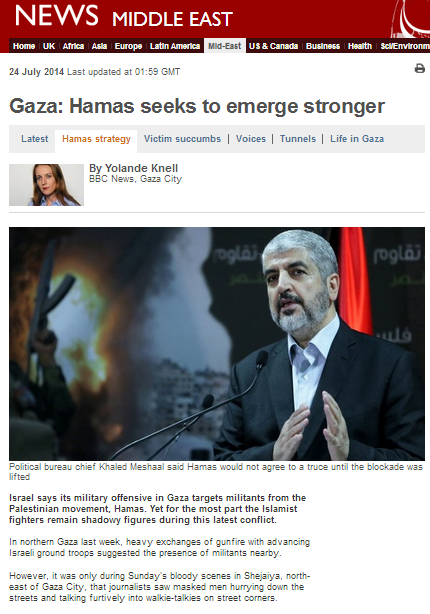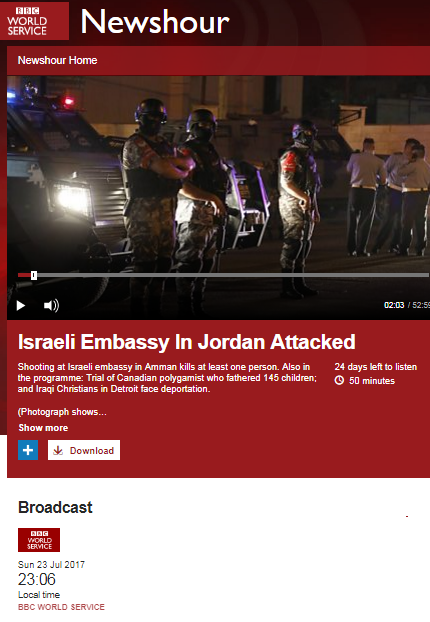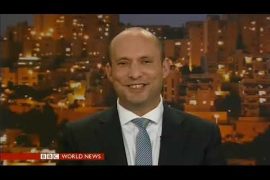As was noted in this recent post, an article by Yolande Knell titled “Gaza: Hamas seeks to emerge stronger” appeared in the ‘Features & Analysis’ section of the BBC News website’s Middle East page on July 24th. The article includes the following interesting passages:
“Israel says its military offensive in Gaza targets militants from the Palestinian movement, Hamas. Yet for the most part the Islamist fighters remain shadowy figures during this latest conflict.
In northern Gaza last week, heavy exchanges of gunfire with advancing Israeli ground troops suggested the presence of militants nearby.
However, it was only during Sunday’s bloody scenes in Shejaiya, north-east of Gaza City, that journalists saw masked men hurrying down the streets and talking furtively into walkie-talkies on street corners. […]
There have been occasional televised statements by the former Hamas Prime Minister, Ismail Haniyeh, but most of the Islamist group’s officials have gone to ground during this conflict. Their houses tend to be empty when they are targeted by Israeli air strikes.
The only place where we have been able to approach Hamas spokesmen is at the Shifa Hospital in Gaza City where they make periodic appearances. […]
The large turnouts for funerals of local Hamas leaders killed in the latest conflict are a reminder of how the Islamist movement still commands wide respect in Gaza, which remains among the most socially conservative Palestinian areas.”
BBC television audiences have not seen any footage of those “large turnouts” at Hamas funerals which Knell has apparently witnessed and have not been provided with combatant casualty figures. Although interviews with Hamas spokesmen at Shifa hospital have been aired, audiences have not seen any real reporting of the fact that the Hamas leadership is in hiding in that hospital. Apart from a couple of brief mentions by Lyse Doucet of those “masked men hurrying down the streets and talking furtively into walkie-talkies on street corners”, BBC audiences have not seen any footage or read any accounts of the actions of Hamas terrorists.
They have not seen or been told anything of the fierce battles between terrorists and the IDF: no images of Hamas members firing RPGs, anti-tank missiles or mortars at Israeli troops have been aired. They have not seen footage of the launching of even one of more than 2,350 missiles which have been fired at Israeli civilians since July 8th or of the effects of the 10 to 15% of missiles which fall short and land in the Gaza Strip itself. Neither have they seen any reporting on the topic Hamas’ use of child soldiers.
Yolande Knell would apparently have us believe that not one of the plethora of BBC reporters on the ground in the Gaza Strip in the last nineteen days has witnessed or recorded any of the above.
Now it may well be that foreign correspondents in Gaza – and the BBC among them – are being subjected to pressures which prevent them from reporting anything which does not fall into the category of Israeli military actions or dead and wounded Palestinian civilians. Certainly the social media accounts of some of those reporters would suggest that is the case. But if it is, audiences should obviously be informed for the sake of accuracy and impartiality that they are only receiving a partial picture of events and why that is the case – and that has so far not happened.
In an interesting article in Ha’aretz, former BBC journalist Stephen Games asks “[c]an the BBC really report from Gaza?” and refers to a BBC interview with Andrew Roy who readers may remember was recently to be found patting his organization on the back for its Middle East coverage.
“On another popular BBC radio programme, “Feedback”, which provides a platform for public comment, listeners are said to have complained in equal numbers that BBC coverage was biased either towards Israel or towards the Palestinians.
In response to such contradictory criticism, BBC executives stereotypically say that if they are being criticized from both sides, they must be getting the balance just about right. On this occasion the “Feedback” host, Roger Bolton, stepped back from this glib reply and tried to explore the alternative possibility that the BBC was getting it badly wrong, but this tack was instantly dismissed by his studio guest, the World Editor of BBC News, Andrew Roy.
Roy admitted that covering Gaza was difficult because reporters are at physical risk; but he went on to argue that the BBC was adept at navigating pressure by lobbyists on both sides to adapt its reporting to their liking. He also claimed that its authority came from its being one of the few international broadcasters with a permanent presence in Gaza and having a website to provide further context.
What Roy would not address, however, was Bolton’s suggestion that unlike reporters working in Israel, those in Gaza are hampered by lack of access and by the dangers, not so much to BBC staff, but to potential interviewees, of being targeted if they talk openly. Roy would only acknowledge the danger of working “under bombardment”, giving the impression that the threat to honest journalism came only from Israeli rockets, not from Hamas enforcers.
It was not clear whether Roy refused to acknowledge the impossibility of carrying out normal investigative journalism under Hamas because he—personally or corporately—cannot see it, or because the BBC dare not tell the truth for fear of losing its ringside seat at one of the world’s worst trouble spots.
What did emerge from the interview is the unintended damage caused by the BBC’s ostensible policy of even-handedness. Because it cannot be seen as editorialising, the BBC bends over backwards to maintain a policy of “show-don’t-tell”. Thus, the only truths about Gaza that BBC reporters can convey are those that a camera can point at. Never has a BBC reporter broken a story from Gaza, interviewed a Hamas commander about splits in the ranks, examined the Palestinian justice and detention system, exposed the climate of fear that Gazans are subject to, shown missile stockpiling or residential defensive positions, or challenged the brainwashing of children in schools.”
The obvious result of censorship of vital parts of this story – be it the result of direct outside pressure or self-imposed – is of course that journalists deny their audiences information which is crucial to their being able to reach informed opinions on the topic. But such censorship also has another important effect; it turns journalists into one of the factors actively playing a part in a war which is not only being fought in the alleys of Shuja’iya and Beit Hanoun, but also on the internet, in print, on television, on radio and on social media.
Hamas and the other terrorist organisations in the Gaza Strip know full well that they cannot compete with Israel militarily and hence, as ever, a no less important battle for public opinion around the world is taking place. If BBC journalists continue their current practice of refraining from properly reporting the part being played by Hamas in bringing about the tragic scenes they do film, photograph and report – or at least explaining to audiences why they cannot report the missing parts of the picture – then they clearly compromise their own impartiality by self-conscripting to one side of the battle for public opinion.




